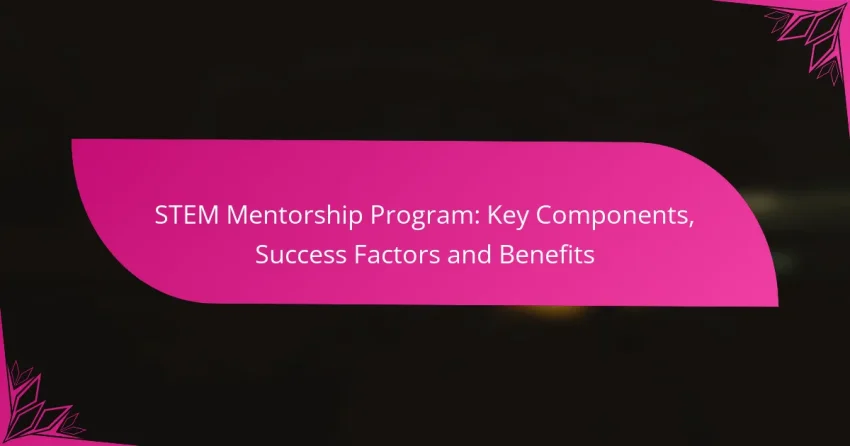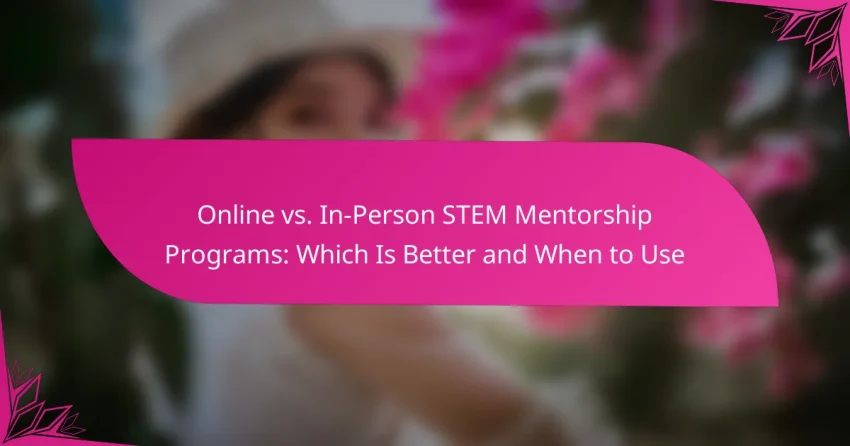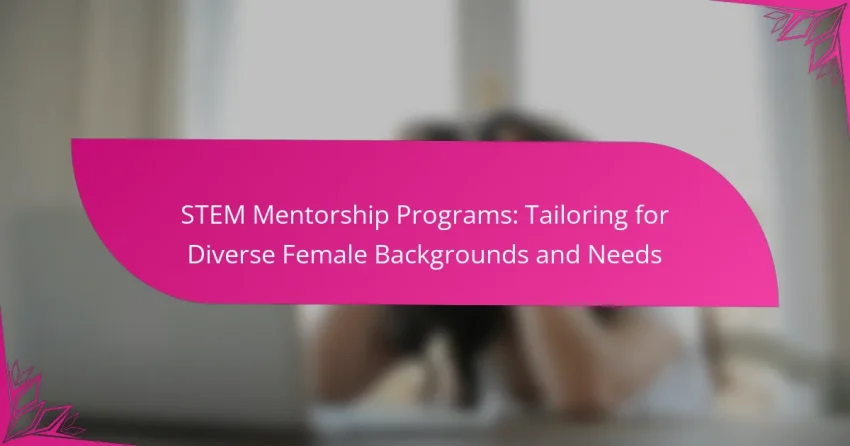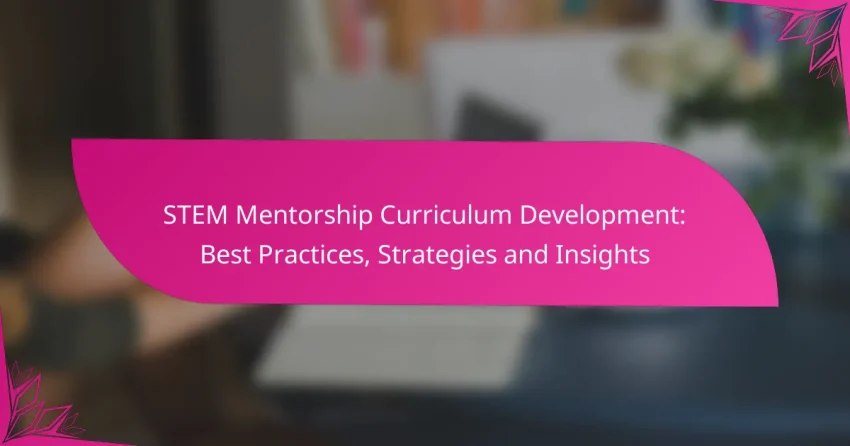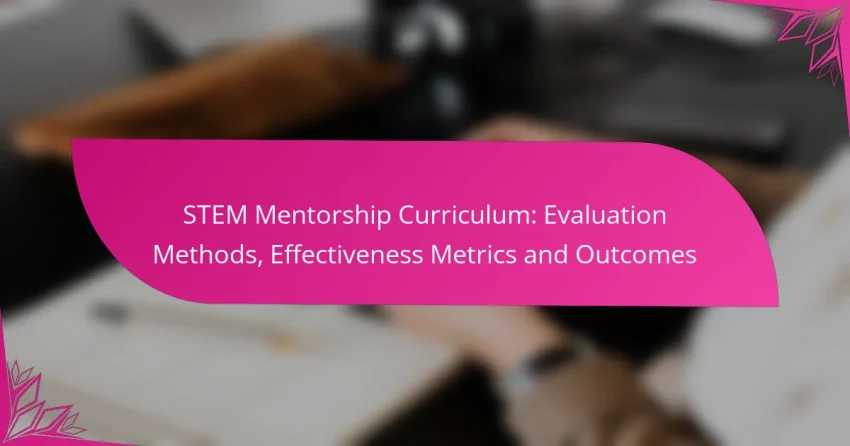A STEM mentorship program is designed to provide essential guidance and support to mentees, fostering meaningful engagement and growth in science, technology, engineering, and mathematics fields. By connecting mentees with experienced professionals, these programs offer valuable resources and insights that contribute to career advancement, academic success, and personal development. Key success factors, such as mentor…
Category: STEM Mentorship Programs for Women: Program Structure and Curriculum
STEM mentorship programs for women are vital initiatives aimed at empowering female participants in science, technology, engineering, and mathematics. By pairing mentees with experienced professionals, these programs offer tailored guidance, resources, and networking opportunities that foster professional growth and address the unique challenges women face in these fields.
Online vs. In-Person STEM Mentorship Programs: Which Is Better and When to Use
Choosing between online and in-person STEM mentorship programs depends on individual needs and circumstances. Online programs provide flexibility and access to a wider network, making them ideal for those facing geographical or time constraints. In contrast, in-person mentorship fosters deeper connections and hands-on experiences, enhancing the overall learning journey. Understanding the strengths of each format…
STEM Mentorship Programs: Tailoring for Diverse Female Backgrounds and Needs
STEM mentorship programs play a crucial role in supporting women from diverse backgrounds by fostering inclusive environments that address their unique challenges. By tailoring mentorship approaches to individual needs and promoting community engagement, these programs enhance career outcomes and create pathways for success in STEM fields. How can STEM mentorship programs support diverse female backgrounds?…
STEM Mentorship Curriculum Development: Best Practices, Strategies and Insights
Developing a robust STEM mentorship curriculum is essential for equipping students with the skills and insights needed in today’s rapidly evolving fields. By setting clear goals, integrating hands-on projects, and engaging industry professionals, programs can create a supportive environment that fosters meaningful connections and encourages collaboration. Selecting dedicated mentors with relevant expertise further enhances the…
Curriculum Impact: Assessing Female Retention in STEM Fields and Strategies
Assessing female retention in STEM fields is crucial for understanding the barriers that women face and for developing effective strategies to support their success. By implementing mentorship programs, inclusive curriculum design, and flexible learning environments, educational institutions can create a more supportive ecosystem that encourages women to pursue and persist in STEM careers. A thoughtfully…
STEM Mentorship Curriculum: Evaluation Methods, Effectiveness Metrics and Outcomes
Evaluating STEM mentorship programs is crucial for understanding their effectiveness and impact on participants. By employing a combination of qualitative and quantitative methods, programs can assess metrics such as participant engagement, skill development, and career progression. The positive outcomes of these initiatives not only foster interest in STEM careers but also enhance academic performance and…
What are effective STEM mentorship programs for women?
Effective STEM mentorship programs for women are structured initiatives designed to support and guide female participants in science, technology, engineering, and mathematics fields. These programs typically pair mentees with experienced professionals who provide advice, resources, and networking opportunities to enhance career development and personal growth.
TechWomen program
The TechWomen program, initiated by the U.S. Department of State, connects emerging women leaders in STEM from Africa, Central and South Asia, and the Middle East with their counterparts in the United States. Participants engage in mentorship and exchange opportunities, gaining hands-on experience in technology companies.
This program includes a five-week mentorship experience, where participants work on projects that enhance their skills and expand their professional networks. It emphasizes leadership development and cultural exchange, making it a unique opportunity for women in STEM.
Girls Who Code
Girls Who Code is a nonprofit organization focused on closing the gender gap in technology by providing girls with the skills and confidence to pursue careers in computer science. The program offers clubs, summer immersion programs, and a dedicated online community.
Participants learn programming languages, work on real-world projects, and receive mentorship from female leaders in tech. The curriculum is designed to be engaging and accessible, ensuring that girls from diverse backgrounds can thrive in a supportive environment.
Women in STEM Mentorship Network
The Women in STEM Mentorship Network connects women at various career stages with mentors who can provide guidance and support in their professional journeys. This network focuses on fostering relationships that empower women to navigate challenges in STEM fields.
Members can participate in structured mentorship programs, networking events, and workshops that cover topics such as career advancement, work-life balance, and technical skills development. The emphasis is on building a community that encourages collaboration and mutual growth.
Society of Women Engineers
The Society of Women Engineers (SWE) is a national organization that aims to support women in engineering and technology. SWE offers mentorship programs that pair experienced engineers with students and early-career professionals to provide guidance and support.
Through local sections and national events, members can access resources such as career coaching, resume reviews, and networking opportunities. SWE also hosts annual conferences that feature workshops and panels, allowing participants to connect with industry leaders.
National Girls Collaborative Project
The National Girls Collaborative Project (NGCP) focuses on bringing together organizations that are committed to encouraging girls to pursue STEM careers. This initiative aims to increase the visibility of programs and resources available to girls interested in STEM.
NGCP offers a variety of resources, including webinars, toolkits, and a comprehensive database of STEM programs across the United States. By fostering collaboration among organizations, NGCP enhances the impact of mentorship and support for girls in STEM, ensuring they have access to the opportunities they need to succeed.
How do STEM mentorship programs support women?
STEM mentorship programs provide essential support for women by fostering professional growth, enhancing skills, and building networks within the industry. These programs create a structured environment where women can gain guidance and resources tailored to their unique challenges in STEM fields.
Career development opportunities
Career development in STEM mentorship programs often includes personalized guidance on career paths, resume building, and interview preparation. Participants can expect to receive insights into various roles within the industry, helping them to make informed decisions about their futures.
Many programs also offer internship placements or job shadowing experiences, allowing women to gain practical exposure to different career options. This hands-on experience is invaluable for building confidence and understanding workplace dynamics.
Networking with industry professionals
Networking is a critical component of STEM mentorship programs, providing women with access to industry leaders and peers. Participants can attend events, workshops, and seminars where they can connect with professionals who can offer advice and potential job opportunities.
Building a strong network can lead to mentorship relationships that extend beyond the program, creating lasting connections that support career advancement. Engaging with a diverse group of professionals can also expose women to various perspectives and experiences within the STEM community.
Skill-building workshops
Skill-building workshops are integral to STEM mentorship programs, focusing on both technical and soft skills. These workshops may cover topics such as coding, data analysis, project management, and effective communication, equipping participants with the tools needed to excel in their careers.
Workshops often incorporate hands-on activities and real-world scenarios, allowing women to practice their skills in a supportive environment. Regular participation in these workshops can significantly enhance a participant’s employability and confidence in their abilities.
What is the structure of STEM mentorship programs?
STEM mentorship programs typically consist of a structured framework that includes various forms of mentoring to support women in science, technology, engineering, and mathematics. These programs often blend one-on-one mentoring, group mentorship sessions, and workshops to create a comprehensive learning environment.
One-on-one mentoring
One-on-one mentoring pairs a mentee with an experienced mentor for personalized guidance. This relationship allows for tailored advice, focused discussions on career goals, and direct feedback on projects or challenges faced in the STEM field.
Mentors often help mentees navigate their educational paths, provide insights into industry trends, and assist with networking opportunities. Regular meetings, typically scheduled bi-weekly or monthly, foster a strong connection and accountability.
Group mentorship sessions
Group mentorship sessions bring together multiple mentees and mentors to discuss common challenges and share experiences. These sessions encourage collaboration and networking among participants, allowing for diverse perspectives on issues in STEM.
Typically held monthly, these sessions can include roundtable discussions, guest speakers, or thematic workshops. They are beneficial for building a sense of community and support among women in STEM, fostering relationships that may extend beyond the program.
Workshops and seminars
Workshops and seminars are integral components of STEM mentorship programs, providing practical skills and knowledge. These events often cover topics such as coding, data analysis, project management, and soft skills like communication and leadership.
Workshops may be hands-on, allowing participants to apply what they learn in real-time, while seminars often feature industry experts sharing insights and trends. Programs may schedule these events quarterly, ensuring that participants continually develop their skill sets and stay updated on industry advancements.
What curriculum components are included in STEM mentorship programs?
STEM mentorship programs typically include a variety of curriculum components designed to equip women with essential skills and knowledge. Key elements often encompass technical skills training, leadership development, and project-based learning.
Technical skills training
Technical skills training is a core component of STEM mentorship programs, focusing on equipping participants with the necessary competencies in fields like coding, data analysis, and engineering principles. Programs often incorporate hands-on workshops and online courses that align with industry standards.
For example, participants may engage in coding bootcamps that teach programming languages such as Python or Java, which are highly sought after in the job market. It’s beneficial to choose programs that offer certifications or practical projects to demonstrate proficiency.
Leadership development
Leadership development in STEM mentorship programs aims to cultivate essential soft skills such as communication, teamwork, and strategic thinking. Workshops and seminars led by industry leaders often focus on building confidence and decision-making abilities.
Participants might also engage in role-playing exercises or group discussions that simulate real-world challenges, helping them to develop a leadership style that resonates with their personal values and professional goals. Networking opportunities with successful women in STEM can further inspire and motivate participants.
Project-based learning
Project-based learning allows participants to apply their technical and leadership skills in real-world scenarios. This experiential approach encourages collaboration and problem-solving, as participants work on projects that address current challenges in STEM fields.
Programs often culminate in a capstone project where participants present their work to peers and mentors. This not only reinforces learning but also enhances their portfolios, making them more competitive in the job market. Selecting projects that align with personal interests can increase engagement and motivation.
What are the prerequisites for joining STEM mentorship programs?
Prerequisites for joining STEM mentorship programs typically include a relevant educational background and a commitment to the program’s duration. These criteria ensure that participants are prepared to engage meaningfully and benefit from the mentorship experience.
Educational background in STEM
A strong educational background in STEM (Science, Technology, Engineering, and Mathematics) is often required for participants in mentorship programs. This may include degrees or coursework in fields such as computer science, biology, engineering, or mathematics.
Some programs may accept candidates with related experience or certifications, particularly if they demonstrate a strong interest in pursuing a STEM career. It’s essential to review specific program requirements, as they can vary widely.
Commitment to program duration
Commitment to the duration of the program is crucial for both mentors and mentees. Most mentorship programs last several months, requiring participants to dedicate time for meetings, workshops, and project work.
Before applying, consider your availability and willingness to engage fully throughout the program. Some programs may have specific attendance requirements or deadlines for completing assignments, so it’s important to be prepared for a structured commitment.
